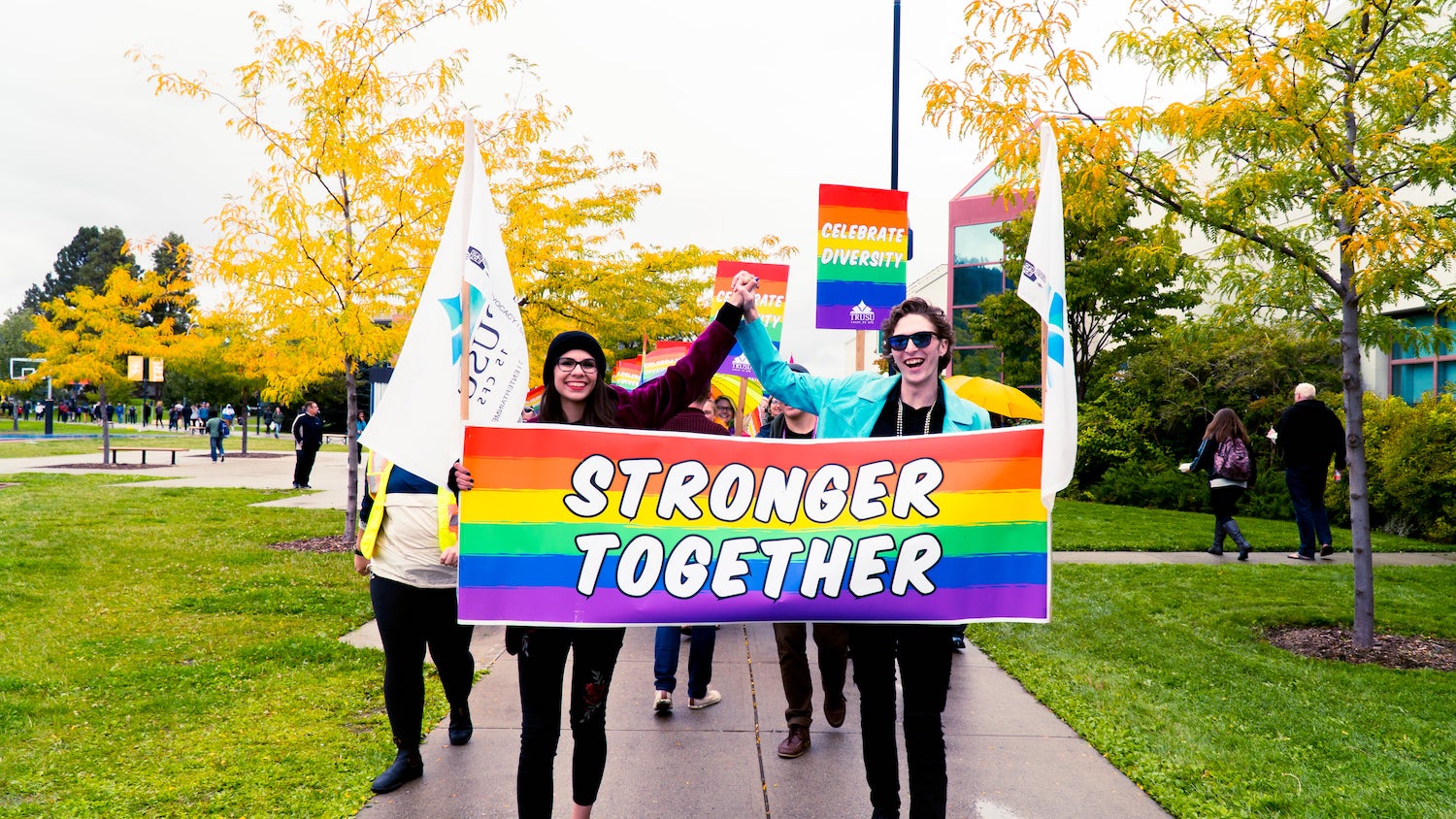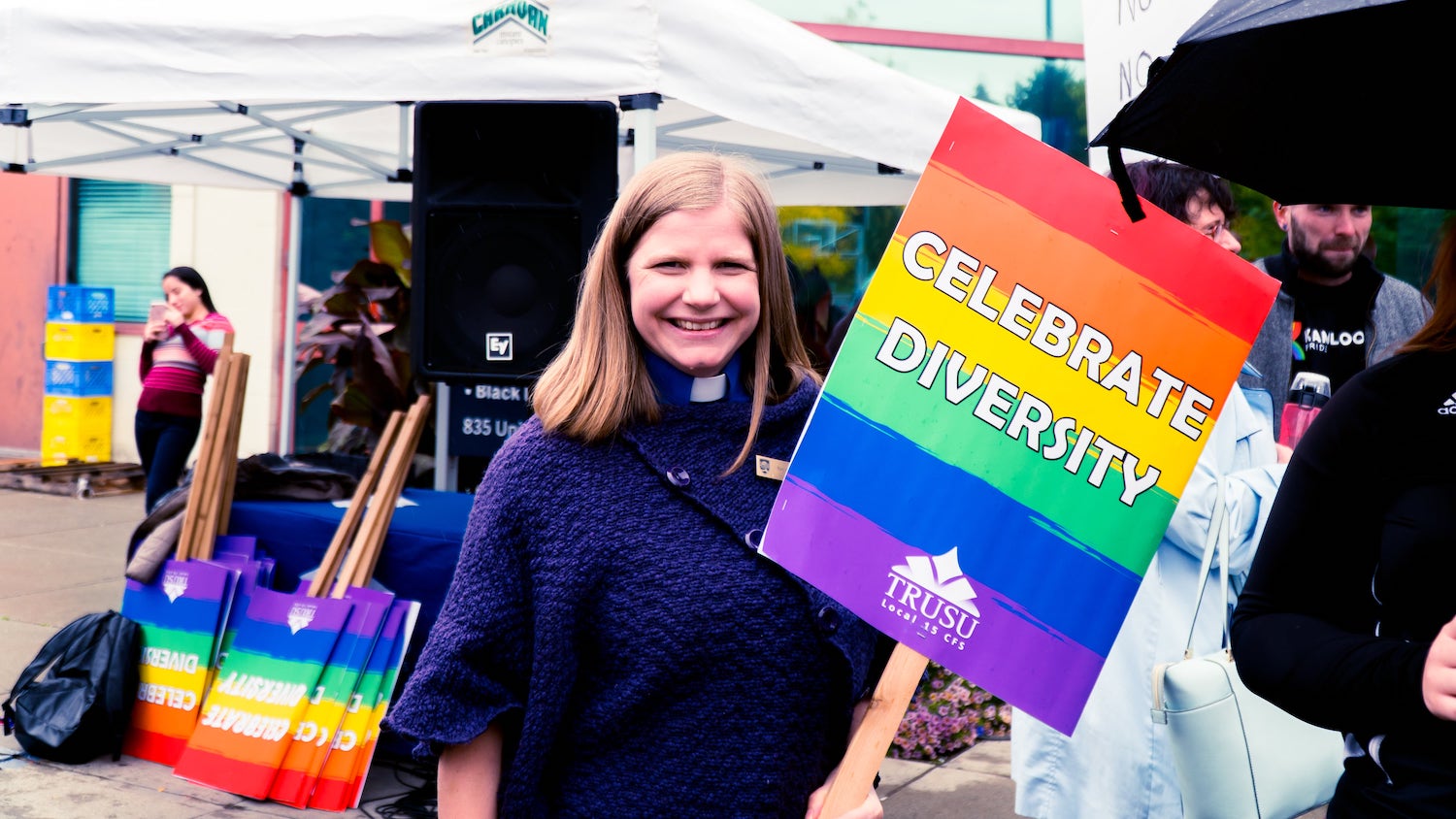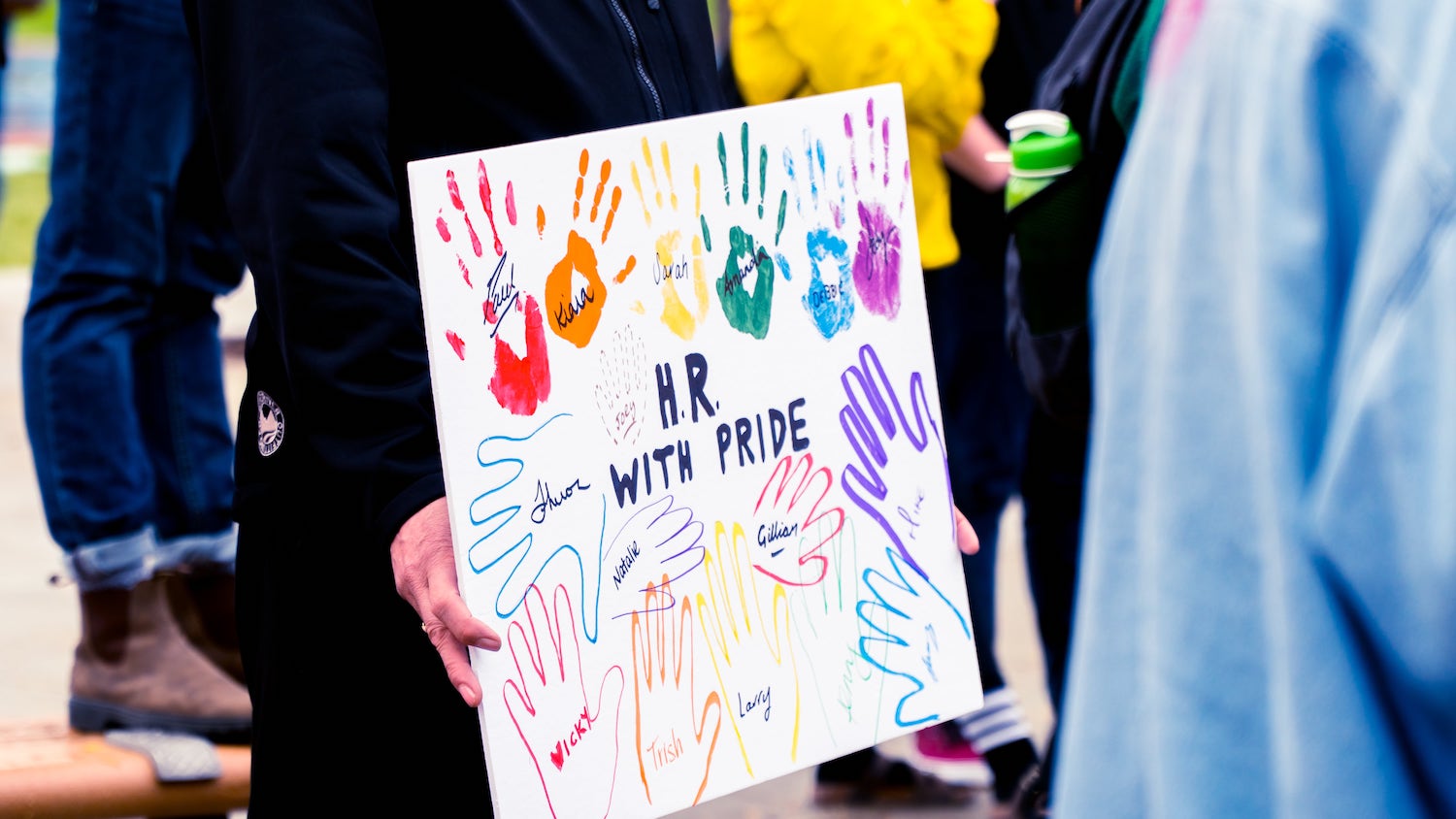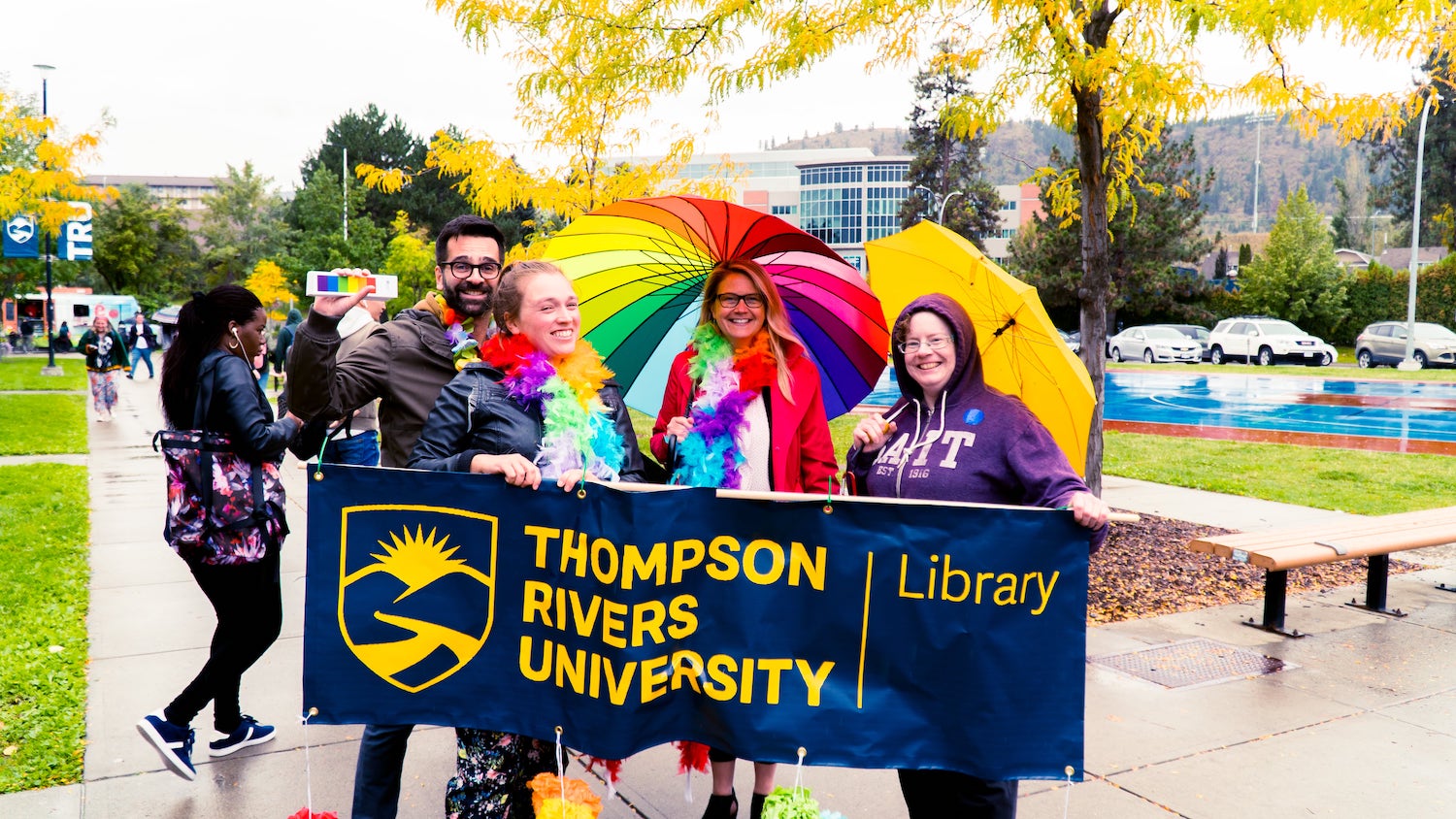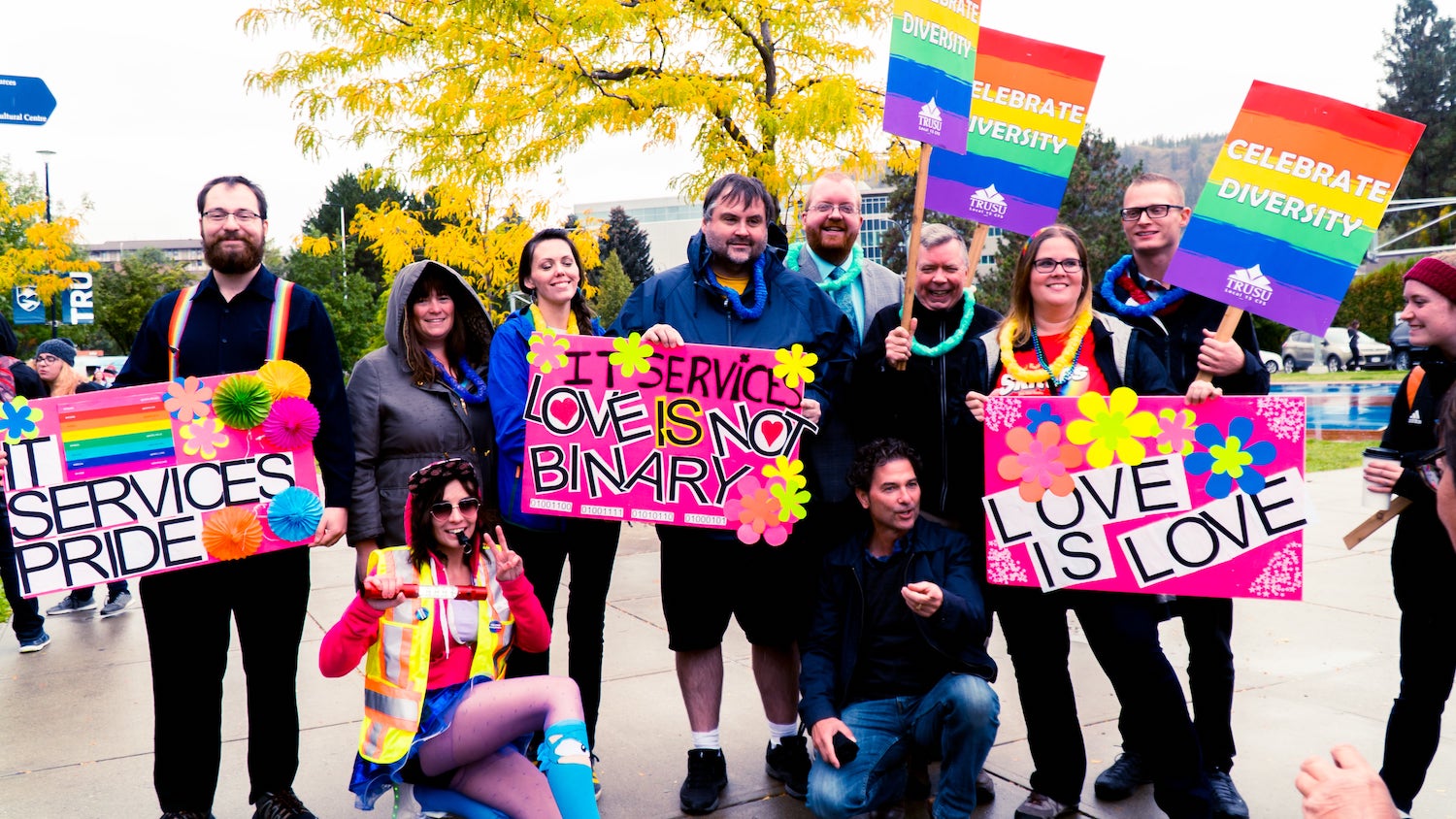Gender and Sexual Diversity
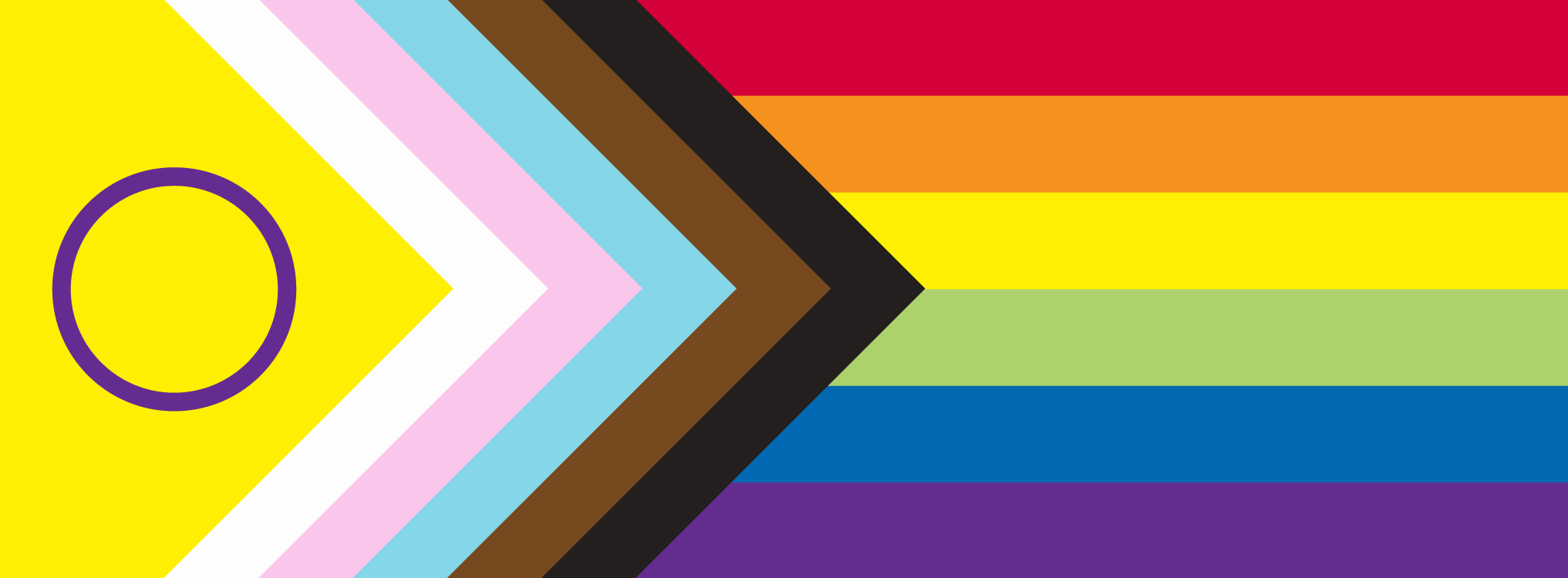
On this Page
Introduction

Safety, inclusion and accessibility is a priority for all students. TRU is working towards advocacy and anti-discrimination efforts for the 2SLGBTQPIA+ community on campus and beyond.
No matter how you identify in regards to the gender identity or sexuality spectrum - which includes lesbian, gay, bisexual, trans*, queer/questioning and two-spirit (2SLGBTQPIA+) individuals - whether you are questioning, curious, coming out or letting someone in – Student Services can offer a space for support, discussion and reflection.
Gender-affirming clothing collection
TRU Gender & Sexual Diversity is pleased to offer a gender affirming clothing collection directly outside Old Main room 1464 in collaboration with the Kamloops United Church Thrift Store. These items are replenished regularly through donations and local sourcing and are free for students who may not otherwise be able to obtain clothing that affirms their identity. Please consider the following points when accessing this resource:
- Please treat the space with respect; leave it as you found it!
- Clothes and accessories are not gendered or organized by size. In offering an inclusive, gender-affirming experience, students accessing this resource should feel empowered to select any item that they identify with or that sparks joy.
- Twelve-dollar vouchers are available for the Kamloops United Church Thrift Store located at 421 St. Paul Street. They can be used anytime or during their 2SLGBTQPIA+ shopping nights on the second Tuesday of each month between 4 – 7 p.m. Reach out to nfischer@tru.ca for a voucher!
- If you are looking for an item that is not available here (ie. binders, undergarments, etc.) please reach out to nfischer@tru.ca to inquire about additional support options.
Resources
Campus Resources
The Wellness Centre
The Wellness Centre strives to build a respectful and welcoming environment for all students, staff and faculty. The team aims to enhance well-being and foster a sense of community through one-to-one health consultations, workshops, and campus-wide events. The team acknowledges and recognizes that every person has a right to assess and determine their own sexuality, gender identity, and gender expression. Individuals of any and all genders, including gender non-conforming or gender expansive folks are invited to visit this safe and inclusive space to participate in the wide array of educational programming.
Counselling Department
The Counselling office is a respectful, safe and affirming atmosphere for students of all races, ability, ethnicity, sexual orientation, gender identity, religions, age, culture and socioeconomic status. Individual counselling sessions can help find solutions and develop coping strategies for stress, anxiety, depression, grief and other personal issues.
Sexualized Violence Prevention and Response
The Sexualized Violence Prevention and Response office recognizes that because of ongoing discrimination and oppression, 2SLGBTQPIA+ people may experience higher rates of poverty, stigma and marginalization. This may place members of the 2SLGBTQPIA+ community at higher risk of experiencing sexualized violence and additional harm while attempting to seek support and/or justice.
Regardless of when the violence occurred or whether a victim/survivor is interested is any formal reporting processes, the Sexualized Violence Prevention and Response Manager (SVPRM) can provide the following:
- Emotional support and safety planning
- Academic accommodations and emergency housing
- Information about reporting options
- Support through reporting processes if desired
- Connection to campus and community resources
- Support to those providing care to victim/survivors
If you make an appointment, you are welcome to bring a support person. You do not have to disclose an experience of violence in order to connect, and curious parties are welcome to pop by and ask questions without divulging personal experiences.
If you would like to provide any feedback or work alongside the SVPR team to develop safer services and programming, please contact Amber Huva at ahuva@tru.ca.
For more information, please visit Sexualized Violence Prevention and Response.
Additional resources: Rainn.org: LGBTQ Survivors of Sexual Violence
Student Affairs
The Office of Student Affairs advises and assists students on academic integrity, academic appeals, harassment and discrimination, sexual or gender-based violence, emergencies, and student non-academic misconduct. Case Managers also support with personal hardship, financial crisis, emergency housing and guide students to inclusive resources. They can also assist with updates regarding name changes on institutional documentation.
Multi-Faith Chaplaincy
The Multi-Faith Chaplaincy is a religious and spiritual resource encouraging thoughtful reflection and dialogue. Chaplains can provide religious and spiritual care for the diverse membership of the TRU community.
All Gender Washrooms
All gender washrooms are essential to ensuring that campus feels welcoming, accessible and safe. Access to private washrooms decreases fear and anxiety and allows any individual — no matter their gender identity or expression — the autonomy to choose whichever space suits best. Find a list of washroom on our Inclusive and Accessible Spaces page.
TRUSU Pride
TRUSU Pride provides a safe and inclusive space for all 2SLGBTQPIA+ students and allies to get together and socialize. They provide a welcoming environment for everyone to feel safe to express themselves.
Off-Campus Resources
Interior Community Services Safe Spaces Program
Interior Community Services Safe Spaces Program supports youth up to 26 years of age who identify as gay, lesbian, bisexual, transgender, two spirit, queer or questioning and their allies. The service provides drop-in appointments, outreach, support, referrals to other services, weekly peer group meetings as well as resource lending library. The organization also offers sexuality and gender workshops for community service providers and school groups.
Kamloops Pride
Kamloops Pride offers all kinds of social gatherings like Beers for Queers, Espresso Yourself and Pride Choir. Pride Week takes place annually every August. There are also opportunities to engage as a volunteer or as a board member.
Orchards Walk Medical Clinic
Orchards Walk Medical Clinic has a specific team consisting of a family physician, nurse practitioner, clinical counsellor, and registered nurse who work together to provide gender-affirming and primary care services for the 2SLGBTQPIA+ community.
PFLAG Kamloops
PFLAG (Parents and Friends of Lesbians and Gays) Canada is a national non-profit organization that brings together family and friends of 2SLGBTQPIA+ people. The Kamloops chapter, headed by Jim and Grace, will be meeting on the 3rd Thursday of every month. For more information on time and location, call 1-888-530-6777 or email kamloopsbc@pflagcanada.ca.
2SLGBTQPIA+ Liaison Nurses
2SLGBTQPIA+ Liaison Nurses in-person or virtual support for ongoing or isolated physical, emotional, psychological, or other challenges. A self-referral form is available through the link to access services and assistance.
BC Government 2SLGBTQPIA+ Resources
BC Government 2SLGBTQPIA+ Resources access information about various dimensions of queer health and wellbeing, definitions, gender-affirming care, and resources for children.
Foundry
Foundry is a province-wide network of integrated health and wellness services specifically focused on support for individuals aged 12-24. Visit their website to see if any of their services might be a good fit for you.
MOSAIC - I Belong
Based out of Burnaby, but providing programs and support via phone and online, MOSAIC - I Belong offers group and one-on-one support services for 2SLGBTQPIA+ immigrant newcomers.
QMUNITY - BC’s Queer Resource Centre
QMUNITY - BC’s Queer Resource Centre is a Vancouver-based non-profit organization that works to improve queer, trans*, and two-spirit lives. Their building is a safe space for 2SLGBTQPIA+ people to explore themselves, engage with community, and access resources and supports.
- Email: reception@qmunity.ca
- Phone: 604-684-5307
Trans* Care BC
Trans* Care BC provides a centralized database of information and guidance for support and resources, including exploring one’s transition, hormone therapy, surgical interventions, health and well-being, resources for families and parents and more.
Youth In BC Chat/Crisis Lines
Youth In BC Chat/Crisis Lines access immediate, barrier-free, non-judgmental, confidential support and follow-up through 24/7 phone lines and online services.
- Phone: 1-800-784-2433
Egale Canada
Egale Canada is Canada's leading organization for 2SLGBTQPIA+ folks and issues. Through its presence in research, education, advocacy, awareness-building, and commitment to human rights and equity, Egale centralizes innumerable resources, informs policy to impact cultural change and promotes human rights and inclusion.
Friends of Ruby
Friends of Ruby is a Canadian organization committed to providing programming, services, and resources to members of the 2SLGBTQPIA+ community, such as free counselling, housing, and other social supports.
National Suicide Prevention Helpline
National Suicide Prevention Helpline call for immediate suicide prevention support. Dial 9-8-8. In the event of an emergency, dial 9-1-1.
Pflag Canada
Pflag Canada find online resources and supports for a variety of dimensions of queer experiences and identities.
Trans* Lifeline
Trans* Lifeline - Suicide Hotline is Canada’s only crisis and peer-operated hotline that is staffed by trans* people and intended specifically for trans* people. This service strives to connect trans* people with the community, resources, and services they need to find relief, support, and assistance.
The Hatchery
The Hatchery is a gender-affirming care clinic which offers transition-related medical care for those who have a medical aspect to their transition (primarily those seeking or considering hormone replacement therapy or surgical assessment and referral). We take referrals from other physicians and accept self-referrals for those who don't have a family doctor or aren't comfortable asking them for a referral.
- Phone: 778-538-8558
- Fax: 833-333-1711
- Email: patients@hatcherybc.com
Understanding Pronoun Culture: context and insights on the importance of language
“Hi! My name is Nicole Stanchfield, and I use she/her/hers pronouns.”
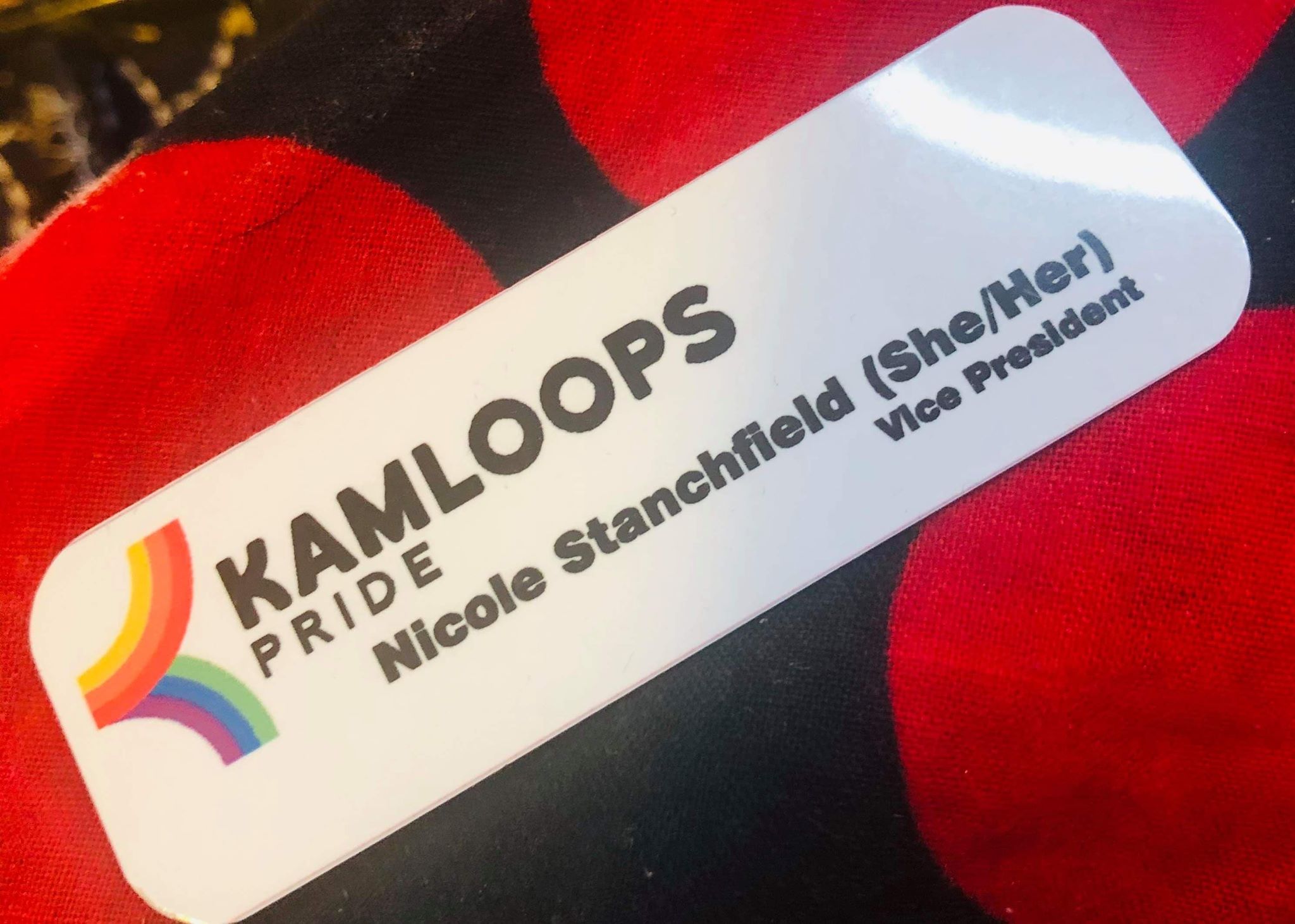
You may have heard me, or someone else, state their pronouns in class, or perhaps you've seen it in an email signature or on nametags. You may wonder why people state their pronouns. You might think that that it's confusing or unnecessary. Perhaps you're afraid to offend someone if you say the wrong thing.
Understanding the prevalence of pronoun use will provide a context to its necessity and importance. If you provide your pronouns, it lets someone from the 2SLGBTQPIA+ community know that you are an ally.
Here are some pointers on how to participate in pronoun culture and why it is so important.
Before we go any further on this subject, I’d like to offer some reflexivity and state that I am cisgender and hold a lot of privilege in my body, as my sex and gender are in alignment. I may not be the most appropriate person to be speaking to the normalization of pronoun culture, but as a member of the 2SLGBTQPIA+ community, many of my friends and loved ones are trans*, non-binary, and/or gender non-conforming and find this conversation tiresome because they always need to defend their identity.
It's necessary to proceed with caution around the vocabulary we use for describing, understanding and supporting individuals; what we know may not be the final or best choice for everyone. Unpacking the way we think about social constructs may help us to be more empathetic, compassionate and considerate people. Gender is social, structural, and interpersonal, so using someone’s appropriate pronoun acknowledges this and recognizes their lived experience, which, in my opinion, is a crucial component to allyship.
The more that pronoun culture is used in public spaces, the saf(er) and more inclusive these spaces become so folks can feel less othered or different, and their identity becomes affirmed and visible. I encourage you to adopt this into your day-to-day conversations with anyone you come across.
Please feel free to say:
“Hi, how are you today? My name is ______, and I use _____ pronouns; what are your pronouns?
or:
“How would you like me to refer to you as?”
If they have previously shared their pronouns, but you need a reminder, say:
“Can you please remind me of which pronouns you would like me to use?”
It might take some practice, but when you hold space for members of equity-seeking groups and make allyship a priority - the rest falls into place.
If you misgender someone by using the incorrect pronoun (and you will), don't apologize profusely when someone corrects you, say:
“Thank you.”
From there, all you have to do is smile, take a breath, use the appropriate pronoun, and move forward with the conversation.
If you have a strong emotional reaction, and say, "I’m sorry," it can place the person in a situation that they have to comfort you for misgendering them, or worse yet, in the uncomfortable position of having to say, “It’s ok”, even when it's not.
(While we're on this subject, pronouns are not “preferred” by folks; it’s not like asking for no tomatoes on your burger! To some, affirming their pronoun is the difference between having a great day and the worst day.)
The next time you are introduced to someone, don’t assume their gender; you can’t always tell by the way someone presents themselves. State your pronouns and ask others to share theirs. All efforts are appreciated! Contribute to the building of inclusive spaces wherever you go, and share this information whenever possible.
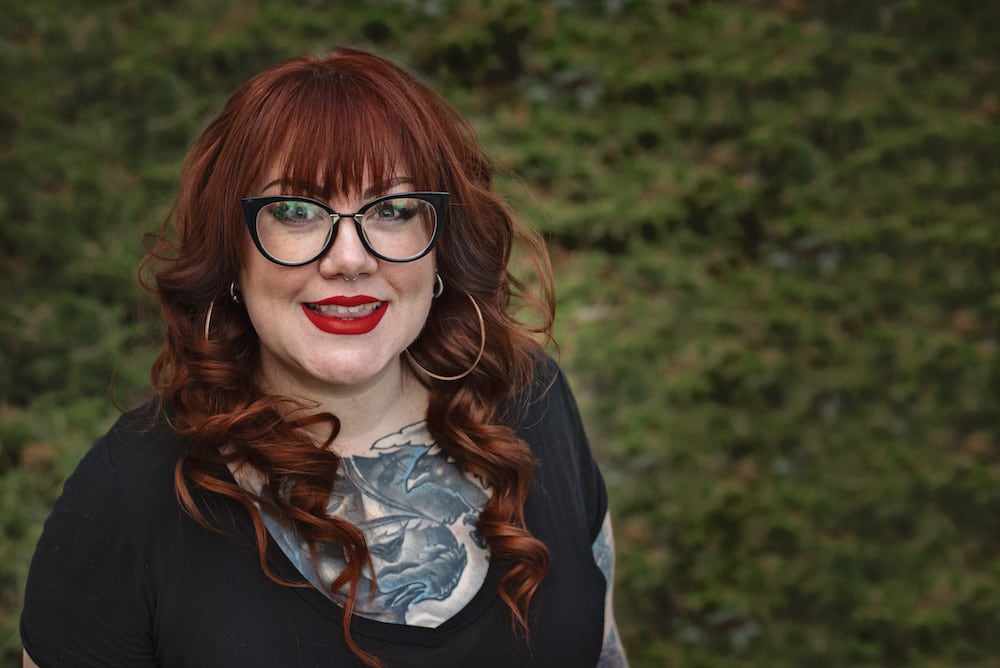
Student Storyteller
Introduction to Queerness: Inclusivity and the 2SLGBTQPIA+ acronym
Student Storyteller Nicole Stanchfield breaks down the differences between Gender Identity, Gender Expression, and Sexual Orientation and answers questions about the amazing 2SLGBTQPIA+ community! This presentation will help participants develop allyship skills, create saf(er) spaces, and use more inclusive language to foster a sense of belonging.
TransFocus Consulting's Final Audit Report
This report contains the findings and recommendations arising from the Gender Diversity Audit conducted by TransFocus Consulting Inc. at Thompson Rivers University from March to December 2019. The audit entailed interviews with 25 institutional stakeholders and one student organization, document reviews, and survey results from 103 students and 204 employees, of which 27 percent and five percent identify as transgender, non-binary, and Two-Spirit (TNB2S), respectively.
As a follow-up to the 2019 TransFocus Consulting gender diversity audit, which assessed records, data, facilities, communications and programs/services, the Faculty of Student Development continued to lead TRU’s efforts in supporting trans*, non-binary and Two-Spirit employees and students. After the final report was published in February 2020, Kai Scott of TransFocus returned to campus to facilitate a Gender Diversity workshop on gender, sex, sexuality, gender expression, pronoun use, common challenges and supportive actions. Scott also participated in the Gender Diversity Implementation Advisory Group meeting to reflect on progress and to provide insights on the next steps.
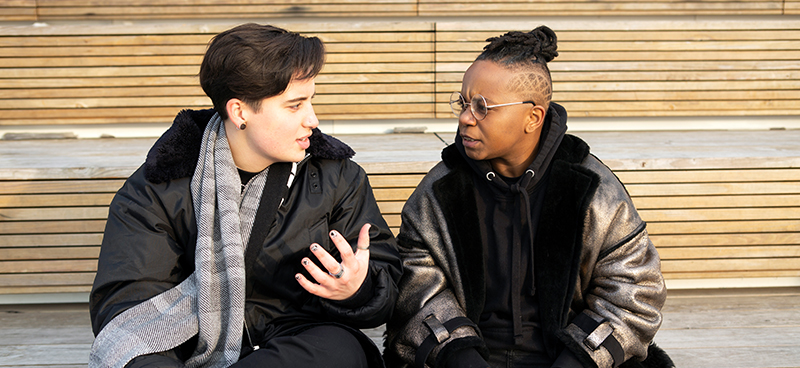
#howdoIally
Being an ally of the 2SLGBTQPIA+ community requires action, visibility and reflection. Allyship is an ongoing work in progress — and it's an inside job.
- Recognize your privileges and internalized biases.
- Acknowledge the intersectional aspects of race, class and religion and understand
- how that can impact an individual's ability to "come out."
- Question or call out homophobic or transphobic rhetoric, commentary and humour.
- Avoid assumptions about sexual or gender identity.
- Ask which pronoun a person uses (but don’t ask what the preference is)
- Consider the individual’s safety — never out someone.
- Resist the urge to encourage an individual to come out before they are ready, as
- there might be internal and external factors you don't understand.
- Use gender-inclusive terms: “Hello, friends” or “Good Morning, all.”
- Study 2SLGBTQPIA+ history before attending Pride events, as understanding context
- is essential when you are a guest in queer spaces.
You Can Play Project
Locker rooms should be safe and sports venues should be free from homophobia. Athletes should be judged on talent, heart and work ethic, not sexual orientation and/or gender identity. The You Can Play Project ensures that 2SLGBTQPIA+ athletes and allies teaming up for respect. TRU WolfPack contributed with their own message to ensure that student-athletes are supported on and off the field.
Know Your Rights
A Toolkit for 2SLGBTQPIA+ Folks in Navigating Youth, Healthcare and Criminal Justice Issues. Know Your Rights is a collaborative project between the Kamloops Pride Association and Pro Bono Students Canada, Thompson Rivers University Law School chapter.
Learn moreFeedback
As TRU continues to expand its supports, initiatives, and resources for 2SLGBTQPIA+ students, we would like to provide an opportunity for direct input on potentially important areas of focus. Though these suggestions may be subject to capacity, accessibility, and prioritization, we welcome any suggestions as a channel for direct engagement with this process! Share your thoughts with us below.
Give us your thoughtsJanuary
Trans* Prisoner Day of Action and Solidarity
January 22
Transgender inmate Marius Mason created this day of action in 2016 to draw attention to recognize the experiences of transgender and other sex-and-gender-minority prisoners.
Transgender individuals who are incarcerated endure stigma, physical and sexual assault, denial of medical care, and legal repercussions. Simply because they are transgender, many transgender persons spend months or even years in solitary confinement. Typically, transgender inmates are housed in male jails, which significantly increases their risk of sexual assault.
February
Aromantic Spectrum Awareness Week
3rd week of the month
Aromanticism is an orientation in which people’s romantic experiences (or lack thereof) are often disconnected from societal normative expectations in some or many ways. This can include:
- Experiencing little or no romantic attraction
- Feeling unattracted to romance
- Being disinterested in romantic relationships
March
International Trans* Day of Visibility
March 31
Every March 31, Trans* Day of Visibility celebrates transgender people and acknowledges the struggles and discrimination that the trans* community might face. Student Services can offer a space for discussion, support, and a sense of community. To learn more about services and resources, refer to the Gender and Sexual Diversity Office at tru.ca/current.
- Take Action: Attend events in support of trans* individuals, challenge forms of anti-trans* violence, use your voice and exercise allyship.
- Engage in Learning: Learn about trans* identities and experiences and how you can contribute to creating safe(r) and more inclusive spaces.
- Raise Awareness: Spread awareness about trans* issues and experiences, amplify support for the trans* community and exercise your role as an ally!
April
International Asexuality Day
April 6
An "ace" (a shortened term for asexual) is someone who experiences limited to no sexual attraction or desire, and, like queerness, it covers a broad spectrum. Asexual people form deep bonds and experience other forms of attraction:
- Romantic
- Aesthetic
- Sensual or physical
- Platonic
- Emotional
Other dimensions of ace identities, such as demisexual and grey-asexual, also fall under this umbrella. Show your support by holding space for ace people and demonstrating your allyship.
Lesbian Visibility Day
April 26
First celebrated in 1990, Lesbian Visibility Day recognizes the contributions lesbian people make to society and raises awareness about the issues they have and continue to face. This day intentionally includes nonbinary and transgender* people and any other individuals who identify as lesbian.
May
International Day Against Homophobia, Transphobia, & Biphobia
May 17
IDAHOBIT aims to coordinate efforts on an international level to raise awareness about 2SLGBTQPIA+ rights violations and ignite interest surrounding these important issues on a global scale.
Pansexual Visibility Day
May 24
Many pansexual or panromantic persons can identify as being "gender blind," as sexual attraction is not restricted to biological sex, gender, or gender identity. Pansexuality encourages us to re-think how we define gender, sexuality, and romance; advocacy and allyship allow folks to explore their own identities within these relationships.
How to Get Involved
- Engage in Community
- Educate Others
- Be curious, respectful and receptive
- Amplify Pansexual Voices (but try not to center yourself by speaking on someone's behalf)
June
Pride Month
June is Pride Month because the first Pride Parade—then called the Christopher Street Liberation Day March—was held one year after the 1969 Stonewall Riots, which started on June 28. The protests between patrons at the Stonewall Inn, a gay bar on Christopher Street, and police, who had come in to raid the establishment, lasted into the night and re-ignited the next night and in the days to follow. Activist groups formally organized over the weeks and months leading to that first anniversary.
July
International Non-Binary People’s Day
July 14
This date celebrates the diversity of the non-binary community, increases visibility, promotes awareness, and dismantles social perceptions of gender identity. Amid the celebration, it's also an opportunity to reflect on the history, progress, and importance of advocacy and allyship moving forward. Non-binary folks may identify as being both a man and a woman or as falling completely outside these categories as someone who does not identify exclusively as a man or a woman. While many non-binary people also identify as transgender, not all do.
August
Kamloops Pride Week
See Kamloops Pride for dates
Offering a mix of comedy shows, dances, discussions, and awareness-raising initiatives - finishing with a big parade and the family-friendly party in Riverside Park - Kamloops Pride provides options for everyone over Pride Week.
September
TRUSU Pride Parade
Contact the Equity Coordinator for more details about the parade
Each September, students, staff, and faculty gather to celebrate gender and sexual diversity at the TRUSU Pride Parade, an event where we claim our campus a safe place to live, work, and study, regardless of your sexual orientation or gender identity. TRUSU recognizes that folks identifying with the 2SLGBTQIA+ Community often face feelings of unacceptance that hinder them from being unapologetically themselves. Having a dedicated day to celebrate pride at TRU is incredibly important for addressing how our environment plays a role in making folks feel genuinely welcomed. All are welcome to participate in the parade and are encouraged to bring a friend to support an inclusive campus environment for the 2SLGBTQIA+ Community. For more information about the parade please contact TRUSU’s Equity Coordinator.
Bisexuality Day
September 23
International Bisexual Awareness Week is celebrated every year from September 16 - 23 in recognition of bisexual identity, honouring bisexual achievements, and raising awareness of bisexual issues.
It started as Celebrate Bisexuality Day (CBD) in 1999 when American bisexual activists Wendy Curry, Michael Page, and Gigi Raven Wilbur conjured the idea at the International Lesbian and Gay Association Conference in Johannesburg. Wishing there was one day to celebrate other bisexuals without fighting for visibility, Wilbur suggested that they host a party, which they did that September.
They chose September to commemorate the birthday month of bisexual icon and Queen frontman Freddie Mercury, with the 23rd chosen as it was Wilbur's date of birth.
From that year forward, Celebrate Bisexuality Day has been observed internationally to celebrate the bisexual community and decrease biphobia. Celebrations were extended to one week in 2014.
October
LGBT History Month
An annual observance of lesbian, gay, bisexual, and transgender history, including its origins and ongoing advocacy efforts. Founded in 1994 by Missouri high school history teacher Rodney Wilson, this month's event is intended to provide role models, build community, and make a civil rights statement about the contributions of the LGBTQ+ community. It is celebrated in October to coincide with National Coming Out Day on October 11 and commemorate the two LGBT rights marches in Washington in 1979 and 1987.
National Coming Out Day
October 11
This day is a celebration of individuals within the 2SLGBTQIA+ community who openly identify as lesbian, gay, bisexual, transgender, non-binary, queer, asexual, intersex or exist anywhere on the queer spectrum. It also honours the complexities of coming out to friends and family - and recognizes that you don’t just have to come out once in a hetero-normative world; you have to do it many times.
Coming Out Day was first celebrated in 1988 on the anniversary of the Second National March on Washington for Lesbian and Gay Rights, which took place in Washington, D.C., on October 11, 1987.
How can you support someone who is thinking about or is actively coming out?
- Remind yourself that coming out is an ongoing process that can involve many emotions, processing, and evolution.
- Coming out and sharing this dimension of oneself requires courage and vulnerability. Don’t be afraid to name this strength; focus on embracing the person’s identity rather than simply accepting it.
- Remember that not everyone might be as accepting and positive as you are.
- Don’t pressure anyone to begin or continue the process of coming out. Everyone moves at their own pace, and there is no “right” or “wrong” way to come out.
International Lesbian Day
October 8
International Lesbian Day is a day to celebrate lesbians and their culture, history, and diversity. Lesbians and allies celebrate this day with various community events, dances, and conferences, and it is mainly celebrated in New Zealand and Australia.
International Pronouns Day
3rd Wednesday in October
Referring to people by the pronouns they determine for themselves is essential to human dignity; using the wrong pronouns or deadnaming someone particularly impacts transgender and gender-nonconforming people. International Pronouns Day began in 2018 and occurs each year on the 3rd Wednesday of October. This awareness-raising initiative seeks to educate, inform, inspire and transform society to honour people’s multiple, intersecting identities.
Spirit Day (Anti-Bullying)
3rd Thursday in October
Started in 2010 by Brittany McMillan, a Canadian teen who was deeply impacted by recent, highly-publicized bullying-related suicides. Observers wear the colour purple as a visible sign of support for LGBTQ youth, in honour of those who died by suicide and as a call to action against abuse, harassment and homophobia.
Asexual Awareness Week
3rd week of October
Ace Week is an annual campaign to raise awareness, build community, and create change around the world. Make a difference with us from October 22 – 28
Intersex Awareness Day
October 26
“Intersex” is an umbrella term for people who are born with one or more traits in their chromosomes, genitals, hormones, or internal reproductive organs that don’t fit the typical male or female patterns. Some traits might not match the sex they were assigned at birth or may combine traditionally understood male and female traits. The first Intersex Awareness Day public demonstration by intersex people took place on October 26, 1996, in Boston, Massachusetts, outside a conference of the American Academy of Pediatrics.
November
Trans* Parent Day
1st Sunday in November
The first Sunday in November is Trans* Parent Day. This awareness day was established in 2009 to honour and celebrate transgender, non-binary, and gender non-conforming parents and parents of transgender children. The day typically involves small celebrations and gift-giving in the same spirit as Mother’s Day and Father’s Day.
Trans* Day of Remembrance
November 20
Following Trans* Awareness Week - 2nd week in November - International Transgender Day of Remembrance (TDOR) takes place on Nov. 20. This day brings public awareness to the dangers of transphobia and the violent hate crimes experienced by transgender, gender non-conforming, non-binary and Two-Spirit people.
Join TRUSU Pride and Kamloops Pride on Nov. 20 at 7 p.m. for the annual Transgender Day of Remembrance Vigil at the Kamloops United Church on 421 St. Paul Street.
TRU is honouring TDOR by displaying the trans* flag at half-mast on campus; please take a moment to reflect on creating inclusive, safe(r) spaces at TRU and in the community. To learn more about services and resources, refer to the Gender and Sexual Diversity page at tru.ca/current.
December
Pansexual Pride Day
December 8
Every December 8, National Pansexual Pride Day celebrates the efforts made by the pansexual and panromantic community to gain acceptance and understanding. Many pansexual or panromantic persons feel sexual attraction as not defined or assigned to a particular biological sex, gender, or gender identity.
Photo gallery of Pride Parade
